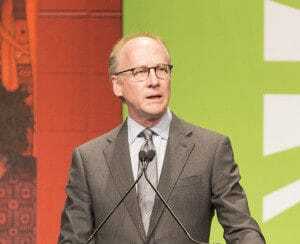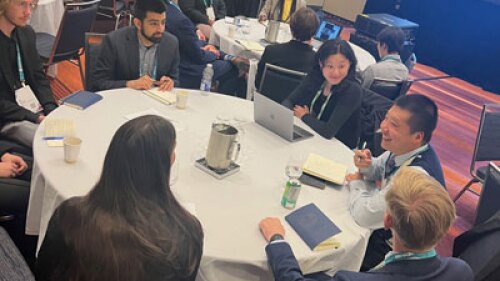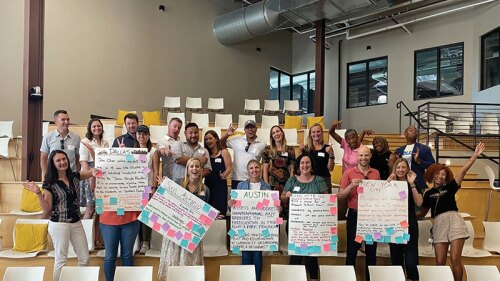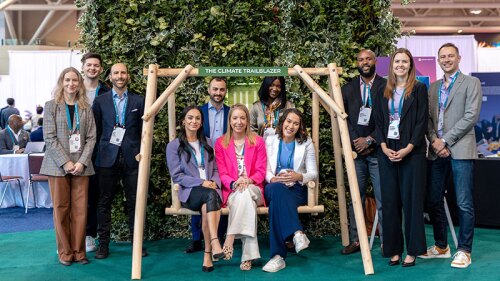The following is an excerpt from remarks by ULI Global CEO Patrick Phillips to attendees at the 2016 Spring Meeting in Philadelphia.
Like most parts of our industry, the state of ULI is strong. Our Spring Meeting in Philadelphia brought 3,500-plus people to the city, and we set record numbers for Product Council attendance. Our membership growth is also strong—we are within a whisker of 40,000 [members], and that is right about where we were before the financial crisis. So, we’ve recovered our membership, but in the process, we’ve built a much more durable and resilient ULI. We have a broader geographic reach, a much stronger District and National Council network, and more diverse membership. We’ve forged a closer connection between your interests and ULI’s program of work, and we are working to make it easier for you to understand the organization and customize your own experience.
I want to touch on a couple of things that are current for us, and a couple of things that are emerging. The first is ULI’s Global Evolution Initiative, which is our effort to adjust the organization’s structure to better serve our growing global footprint. This initiative is about building a structure that strengthens and better connects the local and global aspects of ULI. We’re making good progress: we’ve made a series of governance adjustments; we are retooling the executive staff team to improve communications and streamline our operations; and we are developing a new process for planning and allocating resources.
The initiative is an investment in ULI’s future, and it’s driven by our goal to make it easier for you to connect and contribute. It’s an initiative that reflects a strong and confident organization, the relevance of ULI’s mission, the breadth and commitment of our membership, and the tremendous on-the-ground impact of our programs, especially those delivered through the District and National Councils. We want to make the organization more transparent and more consistent in its operations, and ultimately more relevant and more valuable for you.
I’d like to spend a couple of minutes on the Product Council program. Councils have always been a primary program at ULI, and we’ve seen significant improvements in the program’s performance. We have innovative new programs in place to connect younger members to our Product Councils, introduce public sector members to the Product Councils, and revise the programming and leadership of the councils themselves. At the Spring Meeting, we had more than 400 council guests: they are the people who provide the human capital for new growth in the council program, whether it’s new flights or exploring new topics and opportunities.
The old model for council members was to fly in [to a ULI Spring or Fall Meeting] for their council meeting and head out. Now, council members are becoming much more fully integrated into the rest of the program. The progress is also evident in the increased linkage with the other member networks. We have to respect the integrity and the programmatic autonomy of the councils, but we want to take better advantage of those programs, capturing more of the content from the councils to drive ULI’s program of work and to create impact through alliances and affiliations with the District Councils.
We’ve set a specific priority to increase the value of the council program to ULI, but also to the industry and our communities. We’re aiming to do that without compromising what makes the program great—the frank and open interchange in a small group that occurs in a council room. Kudos to the council leadership, led by Doug Lyons, and the council staff, led by Stephanie Wasser. As part of the new staff structure, we will continue to drive key connections between the Product and District Councils.
I also want to highlight two areas that are emerging as areas for exploration at ULI. We’re hearing from you that these are areas that are affecting how you think about your own activities—investing in, building, and managing the urban environment.
The first revolves around technology—a big topic with a lot of dimensions that affect you and your business. Certainly, there are the aspects of using technology to change business operations—to use tools that make you more efficient and effective. But we’re also very interested in the city-building aspects of technology. The implications of the sharing economy and autonomous vehicles are significant, but equally significant are the implications for public service delivery—how tech can wring more efficiency from infrastructure investments, how mobility can be improved, and how land use regulations can become more about performance and less about specifications, which we think will allow for more product innovation. We’ve held a series of forums to explore this topic, and you can look forward to technology becoming more prominent in ULI’s program of work.
The second area emerging for us is cities as drivers of social equity. As this real estate cycle matures, the beneficial impacts on our cities have been substantial. ULI has been advocating for healthy urban centers since its founding, and it has advocated for compact, walkable, vibrant communities for decades. The recent changes in our cities and our industry are profound, and we are familiar with the major drivers—changing demographics, better public services, falling crime rates, and innovative city-building practices from both the public and private sector. We see new products, more flexible regulations, and more strategic public investment.
But, it’s equally clear that the benefits of this are not equitably distributed. It’s perhaps most visible in the housing affordability challenge faced by most of our major markets, and the attendant political stress revolving around urban housing and mixed-use development. Debates about change and neighborhood gentrification often take on a zero-sum characterization, focusing on winners and losers instead of the common ground we share. As industry leaders, it is up to us to help find solutions and models that can be used to trigger investment in cities, to help achieve better outcomes for a broader cross-section of our population. This will be an area that we will continue to explore in the coming months.
I’d like to close with some information on the new ULI headquarters space in Washington, D.C. In a few weeks, our staff in Washington will move into new offices located in the downtown core. We have a terrific design and a contemporary workplace, both in its visual characteristics as well as its operational characteristics. It is consistent with what ULI stands for: it’s transit friendly, and it’s a workplace that can adapt to accommodate changes in work styles, workforce demographics, and technology. It also represents a careful use of your resources. We benefited from good market timing, we’ve carefully managed our design and construction budget, and we will be delivering the space well under budget and ahead of schedule. This new space is specifically designed with you—the ULI members—in mind. We look forward to welcoming you to the headquarters when you are in Washington.
Thank you for your ongoing support of ULI. We are grateful for your commitment. It’s a privilege to continue to lead the staff side of the organization and to work with you to deliver ULI’s mission in our communities every day.
Visit the ULI Spring Meeting video page to view the full speech by ULI Global CEO Patrick Phillips.




